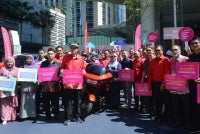Electricity tariff adjustment: Minimal impact on low voltage consumers

PUTRAJAYA - The electricity tariff adjustment under the Imbalance Cost Pass-Through (ICPT) mechanism will have minimal impact on almost all low voltage consumers, whether domestic or non-domestic.
The government has taken the decision to absorb the subsidy cost of RM5.2 billion for electricity bills, in conjunction with the electricity tariff adjustment in Peninsular Malaysia.
This arrangement will be effective from July 1 until Dec 31.
The Natural Resources, Environment and Climate Change (NRECC) Minister Nik Nazmi Nik Ahmad said domestic consumers with a monthly electricity usage of 1,500 kWh and below will not be affected by the increase in electricity tariffs.
"This is 99 per cent from domestic consumers in Peninsular," he said in a press conference on the Peninsular electricity tariff adjustment, here, today.
ICPT is a mechanism approved by the government and implemented by the Energy Commission since Jan 1, 2014, under the Incentive-Based Regulations (IBR) framework.
It is a mechanism allowed Tenaga Nasional Berhad (TNB) to be a utility to control changes in the cost of fuel and power generation that will be provided to consumers through electricity tariffs every six months for adjustment purposes in the form of rebates and surcharges.
He said non-domestic consumers of low voltage tariff categories (B and D tariffs) and specific agricultural tariffs (H, H1, and H2) will not be affected by the increase in electricity tariffs, in which the ICPT surcharge will be maintained at a rate of 3.7 sen/kWh.
"In other words, micro, small, and medium businesses (PMKS), including restaurants, grocery stores, bakeries, small workshops, farmers, breeders, and other similar businesses, will not experience any increase in electricity tariffs," he said.
He said the new category of non-domestic consumers, which is water and sewerage operators in the state, will enjoy a reduction in the surcharge rate from 20 sen per kWh to 3.7 sen per kWh.
It follows the average fuel price dropping from US$224 per metric tonne in July to December 2022 to US$173.5 per metric tonne for January to June 2023.
"Water operators under the state government will enjoy a lower surcharge from July until December," he said.
Nik Nazmi said the decision was in line with the government's effort to increase the capacity and ability of water operators to provide treated and clean water to consumers.
He said non-domestic consumers such as medium voltage (MV) and high voltage (HV) consumers from the industrial and commercial sectors will enjoy a reduced surcharge rate of 20 sen/kWh to 17 sen/kWh.
"These MV and HV non-domestic consumers will enjoy reductions in electricity bills between 28 and 35 per cent per month," he said.
Only one per cent of consumers experience an increase in their electricity bills.
In line with the government's wish in the National Economic Action Council (MTEN) to introduce targeted electricity bill subsidies on July, Nik Nazmi said domestic consumers with high electricity consumption exceeding 1,500 kWh, or equivalent to a minimum electricity bill of RM708 per month, will be charged at a surcharge rate of 10 sen per kWh.
"It is estimated that around 83,000 consumers, which is one per cent of domestic consumers, will experience a minimum 25 per cent increase or RM187 for their monthly electricity bill," he said.
Nik Nazmi said even if there was an increase in domestic consumers in that category, the government would still provide a subsidy of RM58 million since the ICPT surcharge has not been fully waived.
"Consumers can check the amount of subsidies the government covers in their respective monthly electricity bills," he said.
Nik Nazmi said the subsidy was expected to help reduce the people's cost of living, especially during this period of economic recovery, thus ensuring the continued economic development of the country.
Download Sinar Daily application.Click Here!















